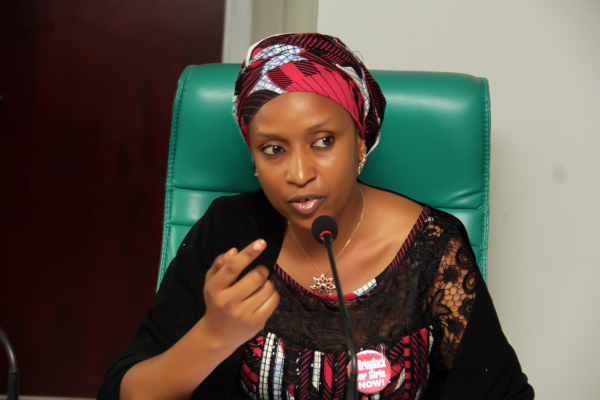…Says Lagos Ports not Congested***
…As Nigeria, Japan sign N642m grant to assist FG’s economic development efforts***
The Nigerian Ports Authority (NPA) Managing Director, Ms Hadiza Bala Usman on Tuesday indicated that the Authority lacks the constitutional or moral powers to compel importers to use any particular port.
The NPA Boss stated this in Port Harcourt, at the Rivers Port Stakeholders’ meeting, enlightening those who accused the Authority of watching Lagos ports go into congestion while allowing the Eastern ports to fallow, on the limitations of her management’s powers.
“We must appreciate the fact that the importers retain their rights to use any preferred ports”, Usman who was represented by the NPA Executive Director, Marine and Operations Mr Sokonte Davies said, debunking the notion that the Lagos ports were “congested,”.
Pointing out that the Lagos ports were not congested, she also explained that it is rather the access roads that were in bad shape, for which the government was already assiduously working to fix them.
She equally noted that most of the importers/exporters that used the Lagos ports were from South-West; stressing that the Authority would soon procure six gun boats to tackle security challenges on the waterways.
Speaking further, Usman observed that the NPA had eased up the system of doing business before the executive order was issued, noting that the policy had paid off handsomely.
Usman said the authority did not charge money for services it did not render to importers and exporters.
She said that it would be difficult for all inspecting agents to inspect a vessel at the same time, adding that the exercise could only be done in turns.
Usman promised to address users’ complaints constitutionally and hinted that the meeting would hold quarterly to enhance harmonious relationship between NPA and stakeholders.
The shipping companies/agents had complained of lack of pilot cutters; inadequate security, poor light as well as shallow Bonny channel which needed dredging.
According to stakeholders, big vessels are diverted to other pots due to the shallowness of Bonny Channel, among others.
The Managing Director held a similar meeting on Monday with stakeholders in Onne Ports.
In the meantime, Nigeria and Japan on Tuesday signed a N642 million grant to assist the Federal Government’s economic efforts.
The amount would be provided by the Government of Japan.
The Minister of Budget and National Planning, Sen. Udoma Udo Udoma said this in a statement signed by his Special Adviser on Media, Mr Akpandem James in Abuja.
Udoma said Nigeria was grateful to the Government of Japan for its numerous interventions in various sectors of the country’s economy in support of its development aspirations.
He appreciated the country for its numerous interventions and particularly for aligning its intervention programmes with the Economic Recovery and Growth Plan (ERGP) 2017-2020.
The minister cited the signing of an Exchange of Note (E/N) with the Government of Japan on Emergency Improvement of Electricity Supply Facilities in 2016.
He, however, commended the role Japan played in the development of the National Power Development Master-plan designed to guide government on the optimal energy mix and efficiency for the country.
The minister also thanked the Japanese Government for the various technical assistance offered in a wide range of skill-areas by that government as well as the implementation of other grant projects nationwide.
He assured of the Nigerian government’s commitment to working more closely with the Government of Japan to achieve sustainable economic development for the country.
“We will also continue to explore development options, strategies and paradigms that will engender more mutually beneficial collaborations in support of our long-term friendship.’’
Mr Sadanobu Kusaoke, Japan’s Ambassador Extraordinary and Plenipotentiary to Nigeria, said Japan had been extending grant aids to Nigeria in different fields over the years.
He said that the country considered the grant in health and agriculture particularly important.
He explained that his country considered the grant in the sectors important because advanced pharmaceutical research and improved agricultural production had direct impact on the quality of life.
The ambassador said in view of the demographic and social challenges facing Nigeria, Japan commended the ministry for putting agriculture top in its agenda as captioned in the ERGP.
“Echoing this thinking of our colleagues in Nigeria, Japan is working together with the Ministry of Agriculture and Rural Development for the efficient post-harvest processing of rice crop and improvement of its quality.
“I believe this processing method, when adopted widely in this country could have a huge multiple impacts on job-creation and food security as well as the country’s external balance”, Kusaoke said.
Udoma signed the agreement on behalf of the Federal Government while Kusaoke signed on behalf of his country.
The grant would be used to implement programmes aimed at exploring development strategies that would enhance competitiveness and support the Nigeria’s poverty reduction efforts.
It is also meant to improve standard of living and ensure environmental sustainability.
The support is in line with the development priorities encapsulated in the Economic Recovery and Growth Plan (ERGP) [2017–2020] of the Buhari administration.


















